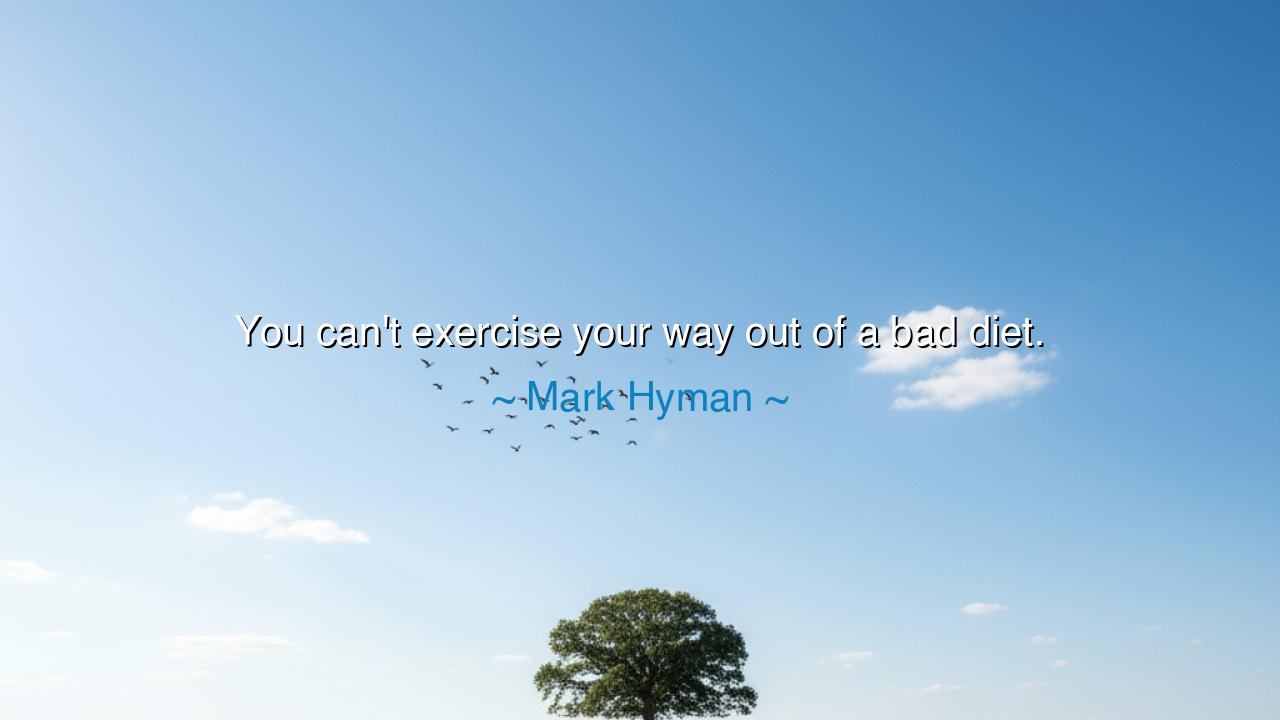
You can't exercise your way out of a bad diet.






In the words of Mark Hyman, “You can’t exercise your way out of a bad diet,” there lies a truth both modern and eternal — a truth that touches the deepest laws of balance, discipline, and natural order. Though spoken in the age of science and gyms, it echoes the ancient wisdom of those who understood that strength begins not with motion, but with nourishment; that the foundation of vitality is not found in exertion alone, but in the harmony between what we consume and how we live. His words remind us that no matter how mighty one’s will or effort, if the roots of health are poisoned, the tree of life cannot flourish.
To say that “you can’t exercise your way out of a bad diet” is to recognize that the body is a temple, not a battlefield. Many in our age believe that pain, sweat, and endurance can redeem the excesses of indulgence — that one may feast without consequence, so long as one later punishes the body into balance. But the ancients knew otherwise. The philosopher Hippocrates, called the father of medicine, taught that food is the first medicine, and that health depends more on what enters the mouth than on how one labors afterward. Hyman’s wisdom restores this principle to a world that has forgotten it: that prevention is the truest form of strength, and harmony more powerful than overexertion.
In the days of Rome, the gladiators were admired for their power, yet their strength was not born of punishment but of care. They ate grains, vegetables, and oils that fortified their endurance. They knew that training the body without feeding it rightly was like sharpening a sword made of clay — it may shine briefly, but it will shatter in battle. Likewise, modern man, with his abundance of food yet scarcity of wisdom, trains for hours while neglecting what he consumes. He seeks redemption in motion, when what he needs is restoration in nourishment. The body, like a sacred machine, cannot be deceived: it demands quality to sustain its fire, not mere quantity of effort.
Consider also the story of the Spartan warriors, whose power became legend. Their training was fierce, yet their diet was simple — lentils, barley, and figs. They understood that discipline of the stomach is discipline of the soul. A soldier who eats carelessly weakens his spirit, no matter how hardened his body. So too does Hyman’s teaching carry this timeless flame: that one cannot separate diet from destiny, nor movement from meaning. To live well is to unite both — to move with purpose and to eat with reverence.
At its heart, this quote is not merely about diet and exercise, but about the illusion of imbalance — the human tendency to overindulge in one area while seeking redemption in another. It speaks of the law of integrity, which the ancients revered: that what is broken in one part of life cannot be healed by excess in another. Just as no amount of gold can purify a corrupt soul, no amount of exercise can cleanse a body continually filled with excess and disregard. The wise know that true health is not transaction but transformation — a harmony between what we take and what we give, between restraint and release.
Mark Hyman’s words are a challenge to modern humanity: to stop treating the body as a machine of indulgence and punishment, and to treat it instead as a living harmony between nourishment, rest, and effort. For the one who exercises endlessly yet eats without thought wages war upon himself, exhausting the spirit while neglecting the root of health. The wise man, however, moves and eats in rhythm with nature — fueling with foods that heal, working with the body rather than against it. In doing so, he achieves a strength that does not fade, a light that does not burn out.
Let this be the lesson handed down: treat your body with reverence, not retribution. Eat what gives life, not what steals it. Move with joy, not as penance. Remember that health is born in the kitchen as much as in the field, in the quiet choices unseen by others. The one who nourishes his body rightly need not labor endlessly to correct his errors; the one who lives with balance need not repent through exhaustion.
Thus, the wisdom of Mark Hyman endures as both reminder and rebuke: that discipline without understanding is futility, and that health is not forged through force, but through alignment. The ancients would have called it the middle path — not denial, not indulgence, but harmony. To live by this truth is to restore the sacred bond between action and sustenance, between body and spirit. And when that harmony is found, man need not struggle to undo what wisdom would have prevented — for in that state, he lives not against his nature, but in the radiant rhythm of life itself.






AAdministratorAdministrator
Welcome, honored guests. Please leave a comment, we will respond soon